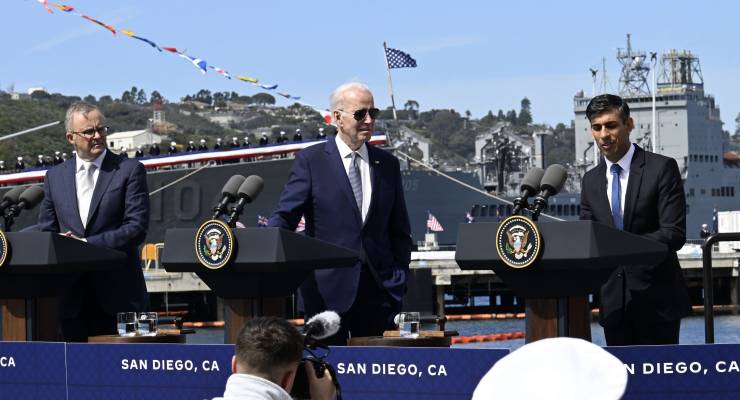
Given the recent internal dissent within Labor branches over the AUKUS security pact, it’s a sure bet that it will be a controversial issue at next month’s ALP national conference. It is also unsurprising that the Albanese government would justify the deal in terms of the “national interest”. Quoting recent analysis, Labor tells us the submarines can “deter actions against Australia’s interests”, and their acquisition is therefore in Australia’s.
The deployment of this rhetoric seems logical. After all, as former US secretary of state Henry Kissinger once said, in the context of the Cuban missile crisis, “When you’re asking Americans to die, you have to be able to explain it in terms of the national interest”. Similarly, if the Australian government wants to commit up to $368 billion of taxpayers’ money to a defence initiative, it must justify it to the Australian people.
AUKUS has bipartisan support, but debate on whether it is in our national interest is hotly contested and highly polarising. In April 2023, less than a month after former prime minister Scott Morrison had attracted bipartisan praise for the defence deal — “a moment of huge significance to our country” — the Australian Institute of International Affairs held a public debate on the proposition that “the AUKUS partnership is in Australia’s national interest”. Interestingly, the adjudicator found that, on balance, the arguments advanced by the negative team were more convincing.
In want of a definition
There persists a conspicuous lack of clarity surrounding the concept of “the national interest”, yet a few things can be said about its deployment.
First, the phrase, like “a good Australian”, is fuzzy — nobody knows exactly what the national interest is, and what it includes and excludes. But this fuzziness makes it a potent discursive weapon.
Second, while mounting a successful “national interest” argument on behalf of AUKUS requires the effective use of key discursive resources, it relies crucially on the cooperation of agents of social influence — including sympathetic public commentators and mainstream media outlets that will help privilege pro-AUKUS voices over those seeking to critically engage with such voices.
In the minds of international relations scholars, “national interest” is always a highly constructed concept, despite the fact politicians always talk about it as if it were part of “common sense” — that it “goes without saying”. For instance, “the national interest” was invoked 640 times during parliamentary debate on Brexit in the UK. Through repetitive deployment, both the Stay and Leave campaigns competitively “recycled” the concept in promoting negative or positive sentiments.
In Australia, less than a decade after Australia had withdrawn from the Vietnam War, evidence emerged that our involvement had been because of “critical pressure” from the US, “for reasons of its own national interests”. Similarly, in 2003 John Howard justified his government’s decision to commit troops to Iraq because “it is lawful and it’s in Australia’s national interest”.
This week, before heading to Berlin to meet the German chancellor and attend the NATO summit, Prime Minister Anthony Albanese responded to criticisms from Paul Keating by saying that Australia’s presence in the NATO forum is “firmly in our national interest”.
Social cohesion
Although “national interest” lacks a clear definition, scholars have analysed it in terms of four basic components: defence, economic, world order and ideological. These often must compete for attention and resources, and consensus is necessarily a result of trade-offs and compromises.
In recent years, commentators in Australia have been calling for a clear articulation of what constitutes this phrase. A few months ago, Heather Smith used her inaugural speech as the new national president of the Australian Institute of International Affairs to argue for the importance of a balanced approach:
In this new world we will need to be clear-eyed about our national interests. In its simplest form the national interest should be about ensuring security, prosperity and social cohesion of the nation and its people, today and into the future.
The social cohesion element is also foregrounded by some security experts. Medcalf and Price, for instance, argued that social cohesion, prosperity and security are all vital areas of national interest, necessitating “building trusted and apolitical engagement with all parts of the community, and notably Australians of Chinese origin”.
Our China policy is the perfect example of a seemingly irreconcilable tension between these core components. That the nation’s defence and economic concerns are at odds with each other is most poignantly — in fact hilariously — demonstrated in a scene from an episode of the ABC’s Utopia. And for this reason, the video clip of the scene is busily doing the rounds on both Australian and Chinese social media.
As for the tension between the economic and ideological, one need look no further than statements from some of our media commentators. In the view of The Sydney Morning Herald’s Peter Hartcher, business people seeking to do business with China despite different political values are “craven characters”.
Who wins?
In the discourse on national interests, what seems to have fallen by the wayside is social cohesion. In most of the debates about AUKUS and speculations about an imminent war with China, few commentators have given much thought to the impact of such rhetoric on society.
As Yun Jiang observes in response to the publication of The Sydney Morning Herald’s “Red Alert” series: “Among all talks about preparation for a war, preparing the population for a potentially divisive society is not part of it.”
Talking up the possibility of a war with China, along with a commensurate expansion of our defence spending, may be believed to deter potential enemies, but research indicates that for many in the various Chinese-Australian communities, reading such speculations has become a constant source of anxiety, fear and uncertainty.
Perhaps the most telling example of how security interests have trumped social relations is the view that a WeChat ban should be considered because of defence concerns — despite a lack of evidence to substantiate such concerns, the “huge cost” of a ban for Chinese Australians, and the fact that scholars have argued such a ban is specifically not in Australia’s national interest.
For the same reason, Osmond Chiu cautions that implementing foreign policy through a defence and security lens risks fuelling “the perception that Chinese Australians would be acceptable collateral damage in a conflict”.
So, the next time someone invokes this all-purpose phrase, perhaps it may be a cue to ask which aspect of the national interest is being promoted; who benefits and who loses; and what kind of compromises and trade-offs are likely involved.
So… what is your definition of ‘national interest’? Let us know your thoughts by writing to letters@crikey.com.au. Please include your full name to be considered for publication. We reserve the right to edit for length and clarity.








Politicians conflate the national interest with their own interest all the time. Sometimes it means there own biases and preconceptions, often what they believe will enhance there prospects of re-election, which is only a small step once they believe themselves being in power is “in the national interest”.
Now can you please do a piece on “(rules based) international order”?
(Rules based) international order is simple. The US makes the rules but doesn’t have to obey them.
But Australia does!
I read earlier this week of a US Democrat saying that the recent decision to send cluster bombs to Ukraine would diminish “US moral authority”. Having visited rural areas of both Cambodia and Laos I agree that the decision is appalling and its consequences will linger for decades.
But diminish US moral authority? Can it go lower?
Different situation. The US was attacking a country. Ukraine want to use them in their own country for defense.
“National interest”? …. “Keeping the plebs from finding out what the government is really doing in their electors’ name, especially with their tax dollars.”?
I’m sure Witness K would agree
I despair of Australia’s ignorant and ill-informed attitudes to Asia. Hartcher’s rantings remind me of the ‘Reds under the Beds’ campaigns of the 1960s.
I don’t know the SMH thinks it’s doing mounting these constant attacks on China. It certainly doesn’t do anything for its desire to be a be regarded as a broadsheet newspaper of informed opinion.
I would have thought by now Australia would have been enmeshed into our region with our closest relations being with our neighbours, a part of ASEAN, perhaps. But no, Australia is still a lonely remnant outpost of a long gone colonial British Empire and still thinks our closest relationships should be with fading white powers on the other side of the globe.
Partly agree, but think you are conflating Asia with China, while there are valid concerns about Xi’s outlook China, but Oz megafone attacks don’t help much e.g. former PM Morrison and colleagues, who left the AUKUS land mine for Labour to deal with….
However, we just had Keating megafoning over NATO opening an office in Tokyo and attacking head Stoltenberg (who is probably familiar with Gareth Evans via ICG & maybe asked who is Keating?) while Keating like others, is ignoring facts on the round and complexity; one recalls Keating referring to ‘Asia’ as somewhere you fly over on the way to Europe.
Such attitudes still abound in Australia where we are encouraged to be ignorant about and bypass Asia (whiff of white Oz & Howard’s influence i.e. looking up to UK & US), especially our near neighbours including Indonesia.
How do you relate, “Making Billions in trade with China to pay for Nuclear Submarines” with, preparing for war with China by spending $385,000,000 buying such submarines”. Surely an Oxymoron if ever there was.
Maybe the chance to flog grossly overpriced military vehicles around the place? $1bn for 100 vehicles for Ukraine costs the taxpayer $10m each for basically a fancy troop carrier????
And while its good export business a $100bn deal with the Germans indicates a price of about $1bn each for a piece of hardware on wheels . ..